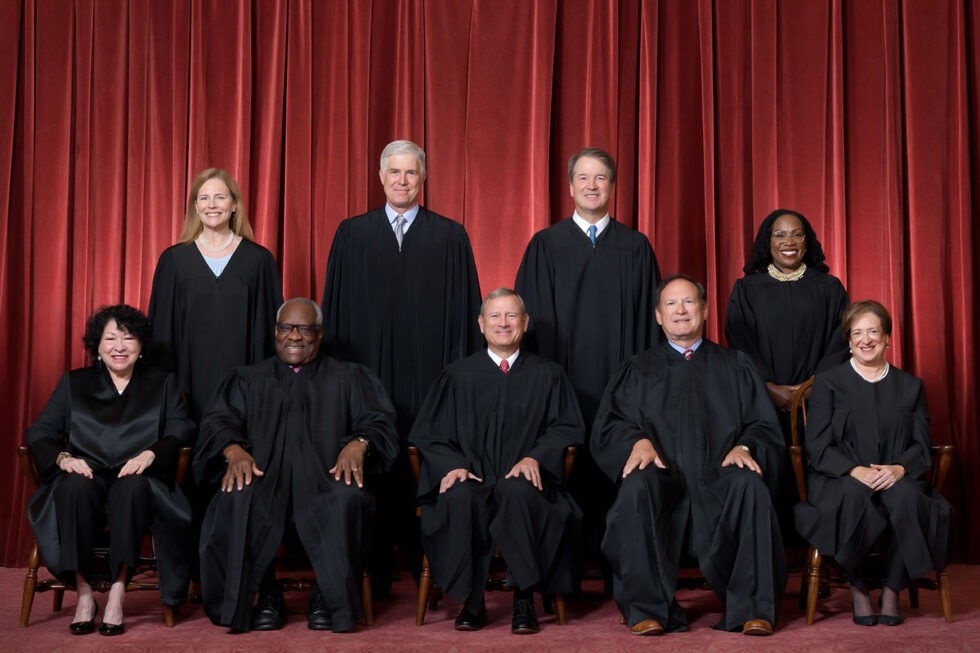
On June 6, 2025, the U.S. Supreme Court granted the Department of Government Efficiency (DOGE) broad access to sensitive Social Security Administration (SSA) data, including personal information such as names, Social Security numbers, work history, and health data. This decision overturned a previous block by a Maryland district judge and has raised significant privacy concerns.
While the ruling does not specifically target the LGBTQ+ community, it has sparked apprehension among privacy advocates and marginalized groups. Critics argue that the lack of adequate safeguards could lead to the misuse of personal data, potentially affecting LGBTQ+ individuals who may already face discrimination. The dissenting liberal justices highlighted the risks to citizens’ privacy and the potential for abuse. =
In a separate but related development, the Supreme Court is also considering a case involving parents’ efforts to exempt their children from school lessons that include LGBTQ+ themes. The outcome of this case could have implications for how LGBTQ+ topics are addressed in educational settings.
The U.S. Supreme Court is currently deliberating on Mahmoud v. Taylor, a pivotal case concerning whether public schools infringe upon parents’ First Amendment rights by mandating their children’s participation in lessons featuring LGBTQ+ themes without offering opt-out provisions. The plaintiffs, comprising Muslim, Christian, and Jewish parents from Montgomery County, Maryland, contend that such requirements conflict with their religious beliefs and seek the reinstatement of opt-out options previously available in the district
During oral arguments held on April 22, 2025, the Court’s conservative justices appeared sympathetic to the parents’ claims. Justices Samuel Alito and Brett Kavanaugh questioned the school district’s rationale for revoking opt-out provisions, especially when similar accommodations exist for other subjects like health education . The district defended its decision by citing administrative challenges and concerns about stigmatizing LGBTQ+ students
Legal experts suggest that a ruling favoring the parents could set a precedent, potentially requiring schools nationwide to provide opt-out options for content conflicting with various religious beliefs. Critics warn that such a decision might lead to widespread educational disruptions and challenges in curriculum planning.
The Supreme Court’s decision in this case is anticipated in the coming weeks and is expected to have significant implications for the balance between religious freedoms and inclusive educational practices in public schools.
Overall, the Supreme Court’s recent decisions and considerations have significant implications for privacy rights and the treatment of LGBTQ+ topics in public institutions.
The U.S. Supreme Court’s recent decision to grant the Department of Government Efficiency (DOGE) broad access to sensitive Social Security Administration (SSA) data is stirring alarm—especially within vulnerable communities, including LGBTQ+ individuals. Let’s break this down in depth.
🔍 What Did the Supreme Court Decide?
On June 6, 2025, the Supreme Court overturned a lower court’s injunction and ruled that DOGE (Department of Government Efficiency) could legally access Social Security data, including:
-
Social Security numbers
-
Employment and income records
-
Disability claims
-
Medical information
-
Addresses and demographic data
The majority opinion, authored by the conservative bloc, held that the federal government has a compelling interest in streamlining services, combating fraud, and “enhancing national efficiency.”
⚠️ Why This Decision Raises LGBTQ+ Concerns
1. Privacy Risks & Surveillance
LGBTQ+ people, especially those who are transgender or nonbinary, often have sensitive government records involving gender markers, name changes, and health treatments. With this ruling:
-
These records may now be centralized and scrutinized by an agency with a vague mandate.
-
Transgender individuals could be outed involuntarily through inter-agency data sharing or leaks.
-
LGBTQ+ people with HIV/AIDS, or those receiving gender-affirming care via Medicaid, may be exposed to additional monitoring.
2. Potential for Targeted Discrimination
Although the ruling does not explicitly target LGBTQ+ people, the broad access to personal data opens the door for:
-
Profiling or de-prioritization of benefits to LGBTQ+ individuals if algorithmic tools or internal bias influences how data is used.
-
Political abuse under less sympathetic administrations—such as targeting LGBTQ+ activists, asylum seekers, or individuals receiving gender-affirming care.
-
The use of gender identity-related data to justify anti-trans legislation or policies under the guise of fraud prevention or system integrity.
3. Mental Health and Economic Vulnerability
LGBTQ+ people, especially youth and seniors, already face higher levels of:
-
Economic hardship
-
Housing insecurity
-
Job discrimination
-
Mental health challenges
If DOGE’s systems unintentionally delay or deny benefits, or if LGBTQ+ individuals avoid applying for support due to fear of being “flagged,” these disparities may worsen dramatically.
🧠 Legal Dissent and Civil Rights Concerns
The liberal justices dissented sharply, warning:
“This ruling establishes a dangerous precedent where sensitive personal data may be accessed and deployed in ways inconsistent with civil liberties and privacy protections.”
Civil rights groups—including Lambda Legal, the ACLU, and the Human Rights Campaign—have raised red flags:
-
The lack of transparency in how DOGE will use the data
-
The absence of independent oversight
-
The potential chilling effect on LGBTQ+ individuals seeking public benefits
📚 Parallel Case in the Pipeline
Also on the Court’s radar: a pending case about whether parents can opt their children out of schoolbooks that feature LGBTQ+ characters or themes. Taken together, these developments may signal a judicial climate more hostile to LGBTQ+ inclusion in public institutions.
🔮 What This Might Mean Going Forward
| Area | Possible Impact |
|---|---|
| Healthcare Access | Trans and queer patients may face more data scrutiny; could affect Medicaid claims. |
| Safety & Privacy | Government agencies could potentially “out” individuals unintentionally. |
| Public Benefits | LGBTQ+ people may avoid applying due to fear of bias or surveillance. |
| Advocacy and Organizing | Activists may be wary of being tracked via government databases. |
| Legal Protections | Reinforces the urgency for federal LGBTQ+ nondiscrimination legislation. |
🏳️🌈 Final Takeaway
While the Supreme Court did not single out LGBTQ+ individuals in this ruling, the structure and scope of DOGE’s access create major implications for marginalized groups. The LGBTQ+ community—particularly trans people, people living with HIV, and those relying on public services—stand to lose significant privacy, autonomy, and potentially access to critical resources.
This decision heightens the urgency for:
-
Stronger data protection laws
-
Robust oversight of government data programs
-
Renewed advocacy for LGBTQ+ rights in federal policy
As of June 2025, the U.S. Supreme Court is deliberating on several significant cases concerning LGBTQ+ rights. Here’s an overview of the key cases:
🏳️⚧️ United States v. Skrmetti
-
Issue: Whether Tennessee’s ban on gender-affirming medical care for minors violates the Equal Protection Clause of the 14th Amendment.
-
Background: Tennessee’s Senate Bill 1 prohibits medical treatments intended to allow a minor to identify with a gender different from their sex assigned at birth.
-
Status: Oral arguments were heard on December 4, 2024. A decision is expected by mid-2025.
📚 Mahmoud v. Taylor
-
Issue: Whether public schools infringe upon parents’ First Amendment rights by requiring children to participate in instruction involving LGBTQ+ themes without allowing opt-outs.
-
Background: Parents in Maryland challenged the school district’s policy mandating participation in LGBTQ-inclusive curricula, arguing it violates their religious freedoms.
-
Status: Oral arguments took place on April 22, 2025. A decision is expected by summer 2025.
⚖️ Ames v. Ohio Department of Youth Services
-
Issue: Whether plaintiffs from majority groups face an unfairly high burden when claiming employment discrimination.
-
Background: Marlean Ames, a straight, white woman, alleged she was denied a promotion in favor of a less-qualified gay colleague. Lower courts dismissed her case, citing a requirement for “background circumstances” to prove discrimination against majority-group members.
-
Outcome: On June 5, 2025, the Supreme Court unanimously ruled that imposing a higher evidentiary standard on majority-group plaintiffs is unconstitutional, allowing Ames’s case to proceed.
🧠 Chiles v. Salazar
-
Issue: Whether Colorado’s ban on conversion therapy for minors infringes upon First Amendment rights.
-
Background: Kaley Chiles, a licensed counselor, argues that the law restricts her freedom of speech and religious expression by prohibiting certain counseling practices.
-
Status: The Court agreed to hear the case in March 2025. Oral arguments are scheduled for the 2025-2026 term, with a decision anticipated by June 2026.
🛂 Kingdom v. Trump
-
Issue: Whether policies prohibiting access to gender-affirming care for transgender individuals in federal custody violate constitutional rights.
-
Background: Three transgender individuals incarcerated in federal prisons filed a class-action lawsuit challenging an executive order and new Bureau of Prisons policies that prohibit their access to gender-affirming care.
-
Status: The case is ongoing in federal court.
These cases reflect the Supreme Court’s engagement with complex issues at the intersection of LGBTQ+ rights, religious freedoms, and anti-discrimination laws. The outcomes will likely have far-reaching effects on legislation and civil rights protections across the United States.







